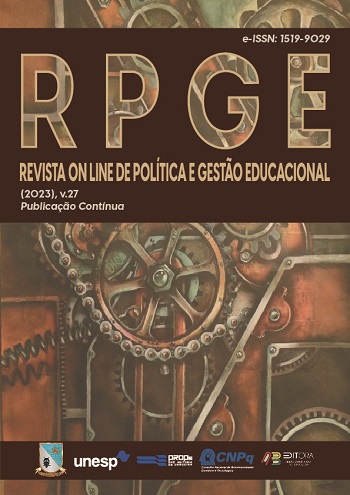Impacto da educação por simulação no desenvolvimento de habilidades profissionais de estudantes
Futuros médicos e assistentes sociais
DOI:
https://doi.org/10.22633/rpge.v27i00.18193Palavras-chave:
Pedagogia, Simulação Educacional, Medicamento, Assistência Médica e Social de EmergênciaResumo
O presente estudo tem como objetivo investigar os impactos da educação por meio de simulação no aprimoramento das habilidades profissionais dos estudantes. Utilizando uma abordagem de pesquisa analítica, os autores envolveram especialistas para avaliar a qualidade das fontes utilizadas. Os resultados obtidos revelam que a capacitação por simulação oferece um ambiente seguro e controlado no qual os estudantes podem praticar e desenvolver suas habilidades, preparando-se adequadamente para lidar com as exigências e pressões das situações reais. Através dessas experiências, os estudantes conseguem aplicar seus conhecimentos, habilidades de tomada de decisão e competências técnicas para gerenciar de forma efetiva situações críticas. Ao incorporar a aprendizagem por simulação no currículo, as instituições de ensino podem fornecer aos estudantes o conhecimento necessário para o desenvolvimento de suas habilidades e competências profissionais.
Downloads
Referências
ALEKSEEV, E. et al. Problems of the efficiency of ensuring environmental security: development of constitutional and legal norms. Lex Humana, v. 15, n. 2, p. 473–486, 2023.
BIRD, S.; FAIRWEATHER, C. B. Military Fatality Rates (by Cause) in Afghanistan and Iraq: a Measure of Hostilities. The International Journal of Epidemiology, v. 36, n. 4, p. 841-846, 2007. DOI: 10.1093/ije/dym103.
BRIDGES, E.; SEERY, G.; ORR, R. The Need for Tactical Medicine Training in Modern Warfare. Military Medicine, v. 186, n. 1-2, p. e12-e16, 2021.
CHEREMISIN, P. A. et al. a digitalization as a new educational paradigm. Revista on line de Política e Gestão Educacional, v. 26, n. esp.2, 2022. DOI: 10.22633/rpge.v26iesp.2.16558.
CHIZH, I. M.; RUSANOV, S. N.; KARPENKO, I. V. Novye metodologicheskie podkhody k podgotovke vypusknikov meditsinskikh vuzov k rabote v usloviiakh chrezvychainykh situatsii [New methodological approaches to training medical university graduates to work in emergency situations]. Clinical Medicine, v. 96, n. 9, p. 847-852, 2018.
EUBANKS, A. A.; VOLNER, K.; LOPREIATO, J. O. Past Present and Future of Simulation in Military Medicine. Treasure Island (FL): StatPearls Publishing, 2022.
GADZAOVA, L. et al. Conditions and opportunities of subject-based learning at universities and its impact on students’ linguistic competence. Revista Conrado, v. 19, n. 90, p. 107-111, 2023.
GLASSBERG, E. et al. Moving Forward with Combat Casualty Care: the IDF-MC Strategic Force Buildup Plan “My Brother’s Keeper”. Israel Medical Association Journal, v. 16, n. 8, p. 469-474, 2014.
HORDIEIEV, V. et al. Application of innovative technologies in the educational process: psychological and pedagogical aspect. Synesis, v. 15, n. 2, p. 132–143, 2023.
JEN HENG, P.; EVELYN, W.; LATEEF, F. Simulation Training for Emergency Teams. Education in Medicine Journal, v. 7, n. 4, p. 37-44, 2015.
KURGANSKY, S. I.; KOVALENKO, E. V.; SOKOLOVA, O. A. Cooperation of training individuals as a methodological basis for enriching the experience of social interaction in young students. Interacción y Perspectiva, v. 13, n. 1, p. 39-49, 2022.
LINDE, A. S.; MCGINNIS, L. J.; THOMPSON, D. M. Multi-Battle Domain-Perspective in Military Medical Simulation Trauma Training. Journal of Trauma and Treatment, v. 6, n. 4, 2017. DOI: 10.4172/2167-1222.1000391.
LOTERO VASQUEZ, D. F.; GARRIDO RAAD, D. R.; RAMÍREZ PEÑA, M. Seguridad y salud en el trabajo, perspectivas metodológicas de investigación. Gaceta Médica de Caracas, v. 130, n. 4, 2022. DOI: 10.47307/gmc.2022.130.4.13.
MOSES, G. et al. Military Medical Modeling and Simulation in the 21st Century. Studies Health Technology and Informatics, v. 81, p. 322-328, 2001.
OKLA, G.; EDEN, D. Learning by Simulation. Middle East Journal of Anesthesiology, v. 23, n. 2, p. 247-250, 2015.
PISARENKO, L. V.; GUMENIUK, S. A.; POTAPOV, V. I. Osobennosti sovremennykh lokalnykh voin i vooruzhennykh konfliktov i problemy okazaniia meditsinskoi pomoshchi naseleniiu v dogospitalnom periode [Peculiarities of modern local wars and armed conflicts and problems of medical care at the prehospital phase]. Disaster Medicine, v. 4, p. 68-72, 2022. DOI: 10.33266/2070-1004-2022-4-68-72.
RABADANOVA, R. et al. Motivational support as a factor of formation of students’ professional competence in the conditions of digitalization of education. Revista on line de Política e Gestão Educacional, v. 26, n. esp.2, 2022. DOI: 10.22633/rpge.v26iesp.2.16547.
RASMUSSEN, T.E. et al. Ahead of the Curve: Sustained Innovation for Future Combat Casualty Care. Journal of Trauma and Acute Care Surgery, v. 79, n. 4, p. 61-64, 2015.
RASMUSSEN, T.E. et al. Combat Casualty Care Research for the Multidomain Battlefield. Journal of Trauma and Acute Care Surgery, v. 83, n. 1, p. 1-3, 2017.
ROSEN, K.R. The History of Medical Simulation. The Journal of Critical Care, v. 26, n. 2, p. 157-166, 2008.
SMIRNOV, N.P.; PEPELIAEV, A.V.; PORFIREV, V.A. Voenno-meditsinskaia podgotovka kursantov: ot voiskovogo opyta k innovatsiiam v obuchenii [Military-medical training of cadets: from military experience to innovations in training]. Modern high technologies, v. 12, n. 3, p. 548-551, 2015.
SMIRNOV, N. P.; RAZGONOV, V. L. Rol simuliatsionnogo obucheniia v formirovanii professionalnykh kompetentnostei u kursantov voennogo vuza [The role of simulation training in the formation of professional competencies in military university cadets]. Modern Problems of Science and Education, v. 4, p. 1-8, 2016. DOI:10.17513/spno.25047.
STROTHER, D. S.; DAVENPORT, M.; HATZFELD, J. J. Advancements in Simulation Training for Tactical Medicine: Preparing Providers for the Next Generation of Warfare. Military Medicine, v. 186, n. 3-4, p. e401-e406, 2021.
VEREMEEVA, S.; KRASNOLOBOVA, E.; GONCHARENKO, O. Innovative methods in the training of veterinarians. Revista on line de Política e Gestão Educacional, v. 26, 2022. DOI: 10.22633/rpge.v26i00.17334.
Downloads
Publicado
Como Citar
Edição
Seção
Licença
Copyright (c) 2023 Revista on line de Política e Gestão Educacional

Este trabalho está licenciado sob uma licença Creative Commons Attribution-NonCommercial-ShareAlike 4.0 International License.
Manuscritos aceitos e publicados são de propriedade da Revista on line de Política e Gestão Educacional. É vedada a submissão integral ou parcial do manuscrito a qualquer outro periódico. A responsabilidade do conteúdo dos artigos é exclusiva dos autores. É vedada a tradução para outro idioma sem a autorização escrita do Editor ouvida a Comissão Editorial Científica.











